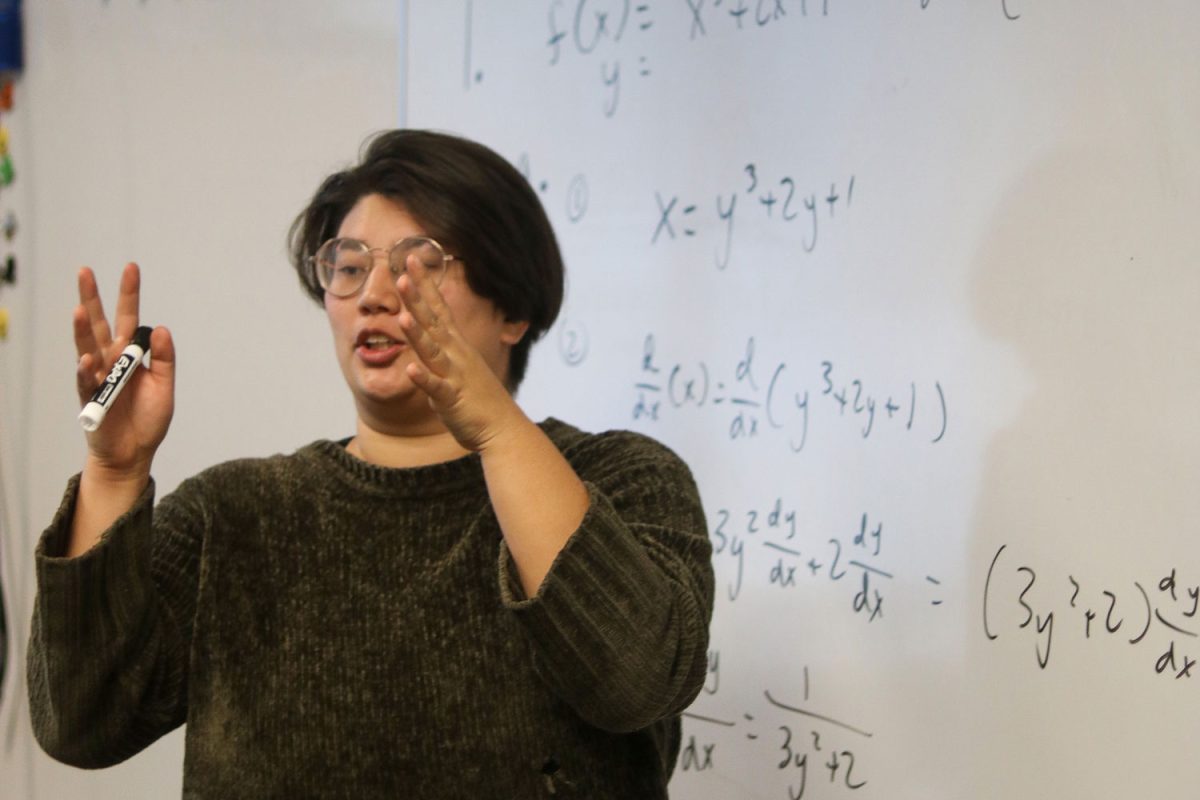The Calculus I curriculum was adjusted to include new changes; teachers think this change needed to happen, while students were surprised by it.
Calc I teachers Rebecca Olivares and Kala Terselic worked to increase the difficulty of the class this year as a result of many variables. According to Olivares the reason behind the shift in direction of the Calc I course was due to the abundance of students interested in taking the AP exam in the previous years. Olivares and Terselic ended up teaching AP interested students outside of class, while students inside the classroom weren’t getting the same learning experience, this created an equity problem.
“There are some students that can’t meet after school or in the mornings,” Olivares said. “So by putting it all into the class periods, we’re making it more equitable.”
Terselic felt that in order to prepare students better, the teachers needed to make the class harder.
“If students are going to be successful on the AP calculus exam, and in future calculus courses, they really need to have a lot of things, unfortunately, memorized,” Terselic said. “They’re not given a formal sheet on the exam in May. And so we’re training the students to be prepared for that kind of memorization required.”
The increase in difficulty was a shock for students when they first started taking the class this year.
“It was just we were kind of thrown in cold water, like a cold plunge and we just had to figure out what to do,” Kori Billingslea, a senior and current Calc I student, said.
Senior Yanwen Shu dropped calculus after the first test of the semester.
“As soon as I finished the test, I leaned over to them, and I was like, I’m gonna drop this class,” Shu said.
Shu views Calc I as burdensome when added to the hecticness of a seniors schedule.
“I had college applications to worry about,” Shu said. “That’s when it gets really intensive. So I was like, ‘I don’t have time to worry about Calc,’” Shu said.
Calc I teachers are aware of the additional burden seniors feel with the difficulty level of the class cranked up.
“Seniors, in particular, seem more worried about having a low grade on the first test, because some of them are applying for early decision or early action,” Olivares said.
Director of College Counselor Kelly Herrington believes that both sticking with the class and dropping the class are viable options. Herrington reminds students that colleges view students not as an extension of their grades, but as a whole person.
“The other thing to remember is one grade in one class is never going to determine a student’s college decision,” Herrington said.
For some students, dropping class made more sense. Herrington urged students to prioritize their wellbeing over their transcript.
“How much if this is going to jeopardize your performance in other classes and your mental health? Please, save yourself,” Herrington said.
Due to when the class was reshaped, students weren’t notified of the increased difficulty until the first day of school.
“Because we worked on this curriculum over the summer, we didn’t have the ability to reach out to students at the end of last year,” Terselic said.
Recognizing this, teachers plan to prep students in predating classes like Pre-Calculus and Intro to Stats by introducing Calc I topics. They plan on approaching math class choices in a similar way as the science department does, by presenting each class choice and their difficulty to students before they have to decide what class they choose to take.
“We’re going to definitely take some time during Pre-Calculus to talk to them about the differences between Applied Calculus and Calculus I,” Olivares said.
Applied Calculus is an alternative to Calc I. In the class students learn the basics of Calc I skills, but in real world contexts.
Students build community in Calc I due to the rigor and intensity of the class.
“I think calculus stressed out a lot of people, but I really like the people in my class. It’s like trauma bonding.” Billingslea said.
Calc I Curriculum Changes
Increased rigor aims for equity
Photo: Teddy Bergstrom
Calculus I teacher Kala Terselic teaching their fifth period Calc I class in CL161
Donate to The Puma Press
Your donation will support the student journalists of UPrep.
About the Contributors

Rayaan Hood, Reporter
Rayaan Hood is a reporter for the Puma Press and this is her first year on staff. She enjoys interviewing as a part of the journalistic process and getting to know more people at UPrep. She likes to spend time with her family and bake.

Teddy Bergstrom, Editor-in-Chief
Teddy Bergstrom is an Editor-in-Chief of the Puma Press. He is a senior and this is his fourth year on staff. He loves to write opinion articles and experientials. His favorite part of journalism is covering the community and telling stories that would otherwise go unheard. Outside of school, he loves his dogs, his sister, and listening to indie folk music.

